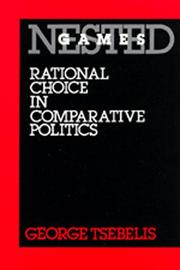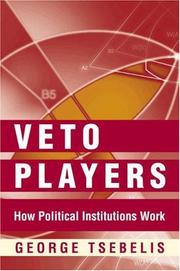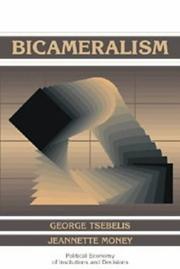| Listing 1 - 10 of 12 | << page >> |
Sort by
|

ISBN: 0520076516 Year: 1990 Publisher: Berkeley, Calif. University of California Press
Abstract | Keywords | Export | Availability | Bookmark
 Loading...
Loading...Choose an application
- Reference Manager
- EndNote
- RefWorks (Direct export to RefWorks)

ISBN: 0691099898 069109988X 9786613589484 1400831458 1280494255 9780691099897 9781400831456 9780691099880 Year: 2002 Publisher: Princeton: Princeton university press,
Abstract | Keywords | Export | Availability | Bookmark
 Loading...
Loading...Choose an application
- Reference Manager
- EndNote
- RefWorks (Direct export to RefWorks)
Political scientists have long classified systems of government as parliamentary or presidential, two-party or multiparty, and so on. But such distinctions often fail to provide useful insights. For example, how are we to compare the United States, a presidential bicameral regime with two weak parties, to Denmark, a parliamentary unicameral regime with many strong parties? Veto Players advances an important, new understanding of how governments are structured. The real distinctions between political systems, contends George Tsebelis, are to be found in the extent to which they afford political actors veto power over policy choices. Drawing richly on game theory, he develops a scheme by which governments can thus be classified. He shows why an increase in the number of "veto players," or an increase in their ideological distance from each other, increases policy stability, impeding significant departures from the status quo. Policy stability affects a series of other key characteristics of polities, argues the author. For example, it leads to high judicial and bureaucratic independence, as well as high government instability (in parliamentary systems). The propositions derived from the theoretical framework Tsebelis develops in the first part of the book are tested in the second part with various data sets from advanced industrialized countries, as well as analysis of legislation in the European Union. Representing the first consistent and consequential theory of comparative politics, Veto Players will be welcomed by students and scholars as a defining text of the discipline. From the preface to the Italian edition: ? "Tsebelis has produced what is today the most original theory for the understanding of the dynamics of contemporary regimes. . . . This book promises to remain a lasting contribution to political analysis."--Gianfranco Pasquino, Professor of Political Science, University of Bologna
Comparative government --- Legislation --- Political planning --- Political science --- #SBIB:054.AANKOOP --- #SBIB:324H40 --- Decision-making in political science --- Planning in politics --- Public policy --- Planning --- Policy sciences --- Politics, Practical --- Public administration --- Legislative process --- Law --- Comparative political systems --- Comparative politics --- Government, Comparative --- Political systems, Comparative --- Decision making --- Politieke structuren: algemeen --- Comparative government. --- Political planning. --- Legislation. --- Decision making. --- Political systems --- Political science - Decision making --- Legislation - European Union countries

ISBN: 1282356097 9786612356094 0520911970 0585330611 9780520911970 9780585330617 9781282356092 0520067320 9780520067325 0520076516 9780520076518 0520076516 9780520076518 Year: 1990 Publisher: Berkeley University press of California
Abstract | Keywords | Export | Availability | Bookmark
 Loading...
Loading...Choose an application
- Reference Manager
- EndNote
- RefWorks (Direct export to RefWorks)
Clearly written and easily understood by the nonspecialist, Nested Games provides a systematic, empirically accurate, and theoretically coherent account of apparently irrational political actions.
Comparative government. --- Social choice. --- Choice, Social --- Collective choice --- Public choice --- Choice (Psychology) --- Social psychology --- Welfare economics --- Comparative political systems --- Comparative politics --- Government, Comparative --- Political systems, Comparative --- Political science --- Comparative government --- Social choice --- Game theory --- behavior and decisions. --- business books. --- comparative politics. --- decision making. --- human behavior. --- human nature. --- human psychology. --- international and world politics. --- irrational decisions. --- poli sci majors. --- political actions. --- political economy. --- political readings. --- political science books. --- political science texts. --- political science. --- political scientists. --- politician books. --- politics and history. --- politics and sociology. --- social choice. --- social science. --- sociology majors. --- strategic thinking. --- theory of decisions.

ISBN: 9781400831456 9780691099897 Year: 2011 Publisher: Princeton, N.J. Princeton University Press
Abstract | Keywords | Export | Availability | Bookmark
 Loading...
Loading...Choose an application
- Reference Manager
- EndNote
- RefWorks (Direct export to RefWorks)

ISBN: 0521580374 052158972X 0511609353 0511823045 9780521580373 9780521589727 9780511609350 Year: 1997 Publisher: Cambridge: Cambridge university press,
Abstract | Keywords | Export | Availability | Bookmark
 Loading...
Loading...Choose an application
- Reference Manager
- EndNote
- RefWorks (Direct export to RefWorks)
This book examines some fifty countries to ascertain how the chambers of bicameral legislatures interact when they produce legislation. An understanding of this interaction is essential because otherwise legislative behaviour in each chamber may be unintelligible or incorrectly interpreted. The book employs cooperative game theoretic models to establish that bicameral legislatures, when compared with unicameral legislatures, increase the stability of the status quo and reduce intercameral differences to one privileged dimension of conflict. Non-cooperative game theoretic models are used to investigate the significance of a series of insitutional devices used to resolve intercameral conflict where a bill is introduced, which chamber has the final word, how many times a bill can shuttle between chambers, and whether conference committees are called. Empirical evidence, mainly from the French Republic, is used to evaluate the arguments.
342.533 --- Legislative bodies --- #SBIB:324H40 --- #SBIB:AANKOOP --- Bicameralism --- Legislatures --- Parliaments --- Unicameral legislatures --- Constitutional law --- Estates (Social orders) --- Representative government and representation --- Legislative power --- 342.533 Eenkamerstelsel. Tweekamerstelsel --- Eenkamerstelsel. Tweekamerstelsel --- Politieke structuren: algemeen --- Legislative bodies. --- Social Sciences --- Political Science --- Representative government and representation. --- Parliamentary government --- Political representation --- Representation --- Self-government --- Constitutional history --- Political science --- Democracy --- Elections --- Republics --- Suffrage
Book
ISBN: 9780415481014 9780203837429 9781136870460 9781136870415 9781136870453 9781138989870 Year: 2011 Publisher: London Routledge
Abstract | Keywords | Export | Availability | Bookmark
 Loading...
Loading...Choose an application
- Reference Manager
- EndNote
- RefWorks (Direct export to RefWorks)
Government --- Political sociology --- Political planning --- Representative government and representation --- Legislation --- Comparative government. --- Politique publique --- Gouvernement représentatif --- Législation --- Institutions politiques comparées --- Gouvernement représentatif --- Législation --- Institutions politiques comparées
Book
ISBN: 0191823333 0191083593 Year: 2016 Publisher: Oxford : Oxford University Press,
Abstract | Keywords | Export | Availability | Bookmark
 Loading...
Loading...Choose an application
- Reference Manager
- EndNote
- RefWorks (Direct export to RefWorks)
This volume investigates the ways in which the interaction between legislative institutions and the policy positions of key actors affects the initiation and passage of legislation. The volume covers seven Latin American countries: Argentina, Brazil, Chile, Colombia, Mexico, Peru, and Uruguay.
Legislative bodies --- Parliamentary practice --- Bill drafting --- Latin America --- Politics and government --- Drafting of bills --- Legislation drafting --- Legislative drafting --- Authorship --- Law --- Legislative procedure --- Order, Rules of --- Parliamentary law --- Parliamentary procedure --- Procedure, Parliamentary --- Rules and practice --- Rules of order --- Debates and debating --- Meetings --- Bicameralism --- Legislatures --- Parliaments --- Unicameral legislatures --- Constitutional law --- Estates (Social orders) --- Representative government and representation --- Language --- Law and legislation --- Asociación Latinoamericana de Libre Comercio countries --- Neotropical region --- Neotropics --- New World tropics --- Spanish America --- 2000-2099
Book
ISBN: 1441958088 9786612927690 1441958096 1282927698 Year: 2010 Publisher: New York : Springer,
Abstract | Keywords | Export | Availability | Bookmark
 Loading...
Loading...Choose an application
- Reference Manager
- EndNote
- RefWorks (Direct export to RefWorks)
George Tsebelis’ veto players approach has become a prominent theory to analyze various research questions in political science. Studies that apply veto player theory deal with the impact of institutions and partisan preferences of legislative activity and policy outcomes. It is used to measure the degree of policy change and, thus, reform capacity in national and international political systems. This volume contains the analysis of leading scholars in the field on these topics and more recent developments regarding theoretical and empirical progress in the area of political reform-making. The contributions come from research areas of political science where veto player theory plays a significant role, including, positive political theory, legislative behavior and legislative decision-making in national and supra-national political systems, policy making and government formation. The contributors to this book add to the current scholarly and public debate on the role of veto players, making it of interest to scholars in political science and policy studies as well as policymakers worldwide.
Legislation -- Congresses. --- Political planning -- Congresses. --- Political science -- Decision making -- Congresses. --- Political planning --- Political science --- Legislation --- Legislative veto --- Political Science --- Government - General --- Political Science - General --- Political Institutions & Public Administration - General --- Law, Politics & Government --- Decision making --- Comparative government. --- Legislation. --- Legislative process --- Comparative political systems --- Comparative politics --- Government, Comparative --- Political systems, Comparative --- Political science. --- Political philosophy. --- Political Science and International Relations. --- Political Science. --- Political Philosophy. --- Law --- Philosophy. --- Political philosophy --- Administration --- Civil government --- Commonwealth, The --- Government --- Political theory --- Political thought --- Politics --- Science, Political --- Social sciences --- State, The
Book
ISBN: 9781441958082 Year: 2010 Publisher: Berlin Springer
Abstract | Keywords | Export | Availability | Bookmark
 Loading...
Loading...Choose an application
- Reference Manager
- EndNote
- RefWorks (Direct export to RefWorks)
Legislation --- Legislative veto --- Political planning --- Political science --- Decision making
Book
ISBN: 9781441958099 Year: 2011 Publisher: New York NY Springer New York Imprint Springer
Abstract | Keywords | Export | Availability | Bookmark
 Loading...
Loading...Choose an application
- Reference Manager
- EndNote
- RefWorks (Direct export to RefWorks)
George Tsebelis' veto players approach has become a prominent theory to analyze various research questions in political science. Studies that apply veto player theory deal with the impact of institutions and partisan preferences of legislative activity and policy outcomes. It is used to measure the degree of policy change and, thus, reform capacity in national and international political systems. This volume contains the analysis of leading scholars in the field on these topics and more recent developments regarding theoretical and empirical progress in the area of political reform-making. The contributions come from research areas of political science where veto player theory plays a significant role, including, positive political theory, legislative behavior and legislative decision-making in national and supra-national political systems, policy making and government formation. The contributors to this book add to the current scholarly and public debate on the role of veto players, making it of interest to scholars in political science and policy studies as well as policymakers worldwide.
| Listing 1 - 10 of 12 | << page >> |
Sort by
|

 Search
Search Feedback
Feedback About UniCat
About UniCat  Help
Help News
News